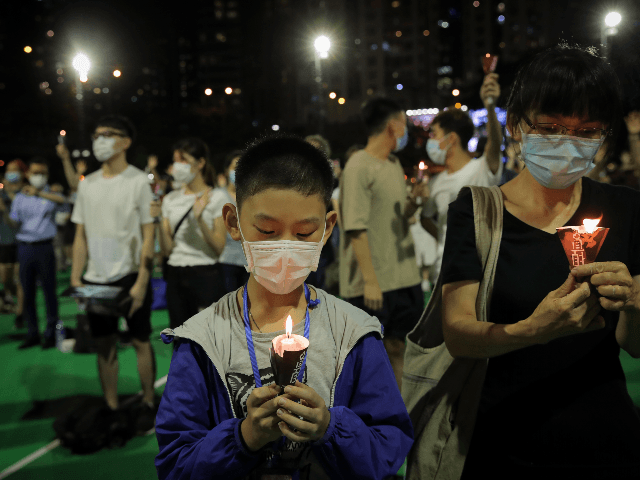Police charged 13 leading Hong Kong democracy activists on Monday with “holding an unauthorized gathering” to mark the anniversary of the Tiananmen Square massacre last month, Hong Kong Free Press (HKFP) reported.
On June 4, tens of thousands of people gathered in Hong Kong’s Victoria Park for a candlelight vigil to mark the anniversary of the 1989 Tiananmen massacre, in which Chinese troops killed peaceful, pro-democracy student protesters. Those who participated in the vigil defied a city-wide ban on large gatherings caused by the ongoing coronavirus pandemic, which saw the annual event officially canceled for the first time.
Hong Kong police later arrested 13 of the city’s leading pro-democracy activists who attended the unauthorized event. On Monday, all were charged with “inciting” an unlawful assembly, an offense with a maximum penalty of five years in jail, according to the report.
Jimmy Lai – the millionaire owner of Hong Kong pro-democracy newspaper Apple Daily – was among those charged on Monday, along with established democracy advocates Albert Ho and Lee Cheuk-yan, and young activist Figo Chan.
According to HKFP, when asked if he understood the charge against him (“inciting” an unlawful assembly) on Monday, Lee responded: “This is political persecution. The real incitement is the massacre conducted by the Chinese Communist Party [CCP] 31 years ago,” Lee added, referring to the Tiananmen Square massacre.
Some of the vigil attendees charged on Monday — along with several other prominent Hong Kong democracy activists — face separate charges in connection with the city’s greater protest movement, set off last summer in response to a proposed extradition bill. The protests, largely peaceful, evolved over the past year into a wider pro-democracy movement condemning China’s encroachment on Hong Kong’s traditional semi-autonomy and free speech rights.
In response to the opposition, the CCP enacted a new national security law on June 30 that officially targets people found guilty of “subversion, secession, terrorism, and foreign collusion.” Under the new law, people found guilty of these so-called threats to national security face a maximum punishment of life in prison.

COMMENTS
Please let us know if you're having issues with commenting.